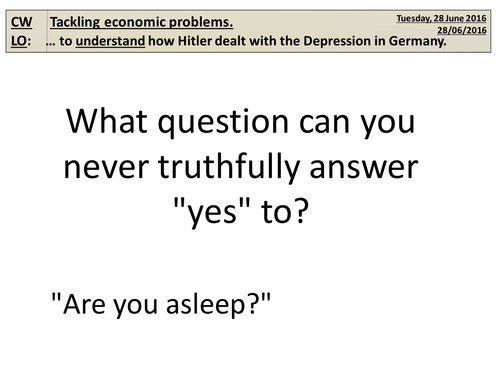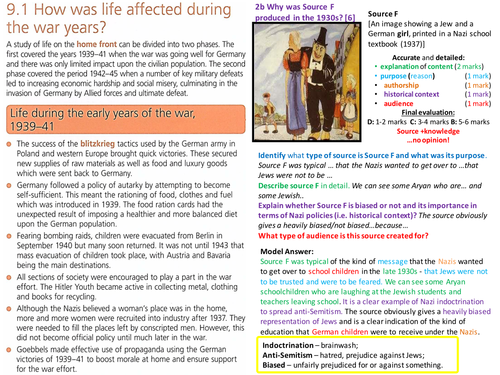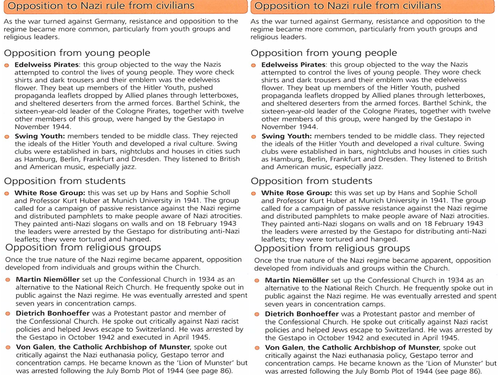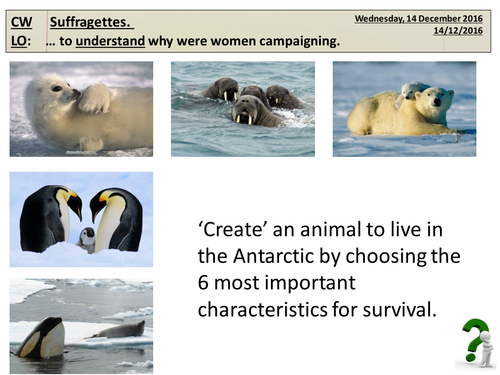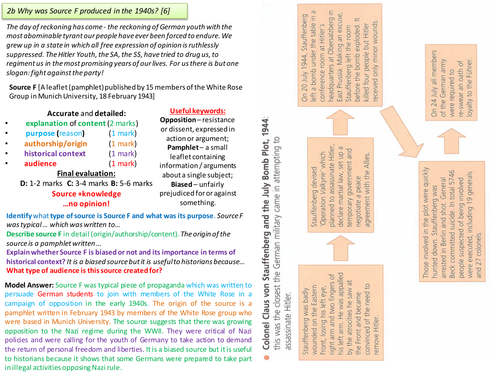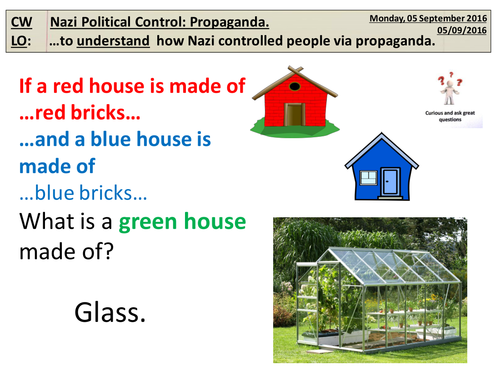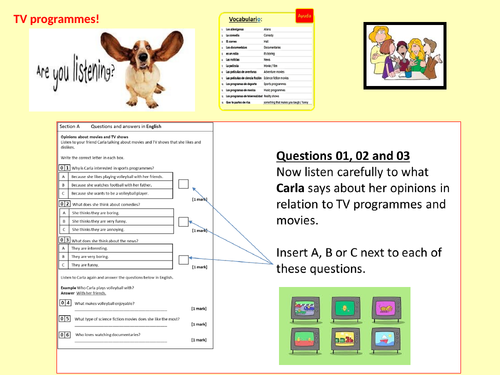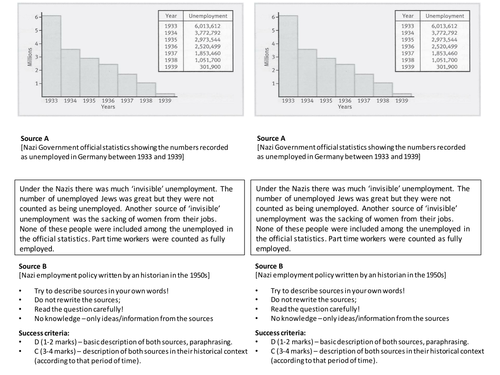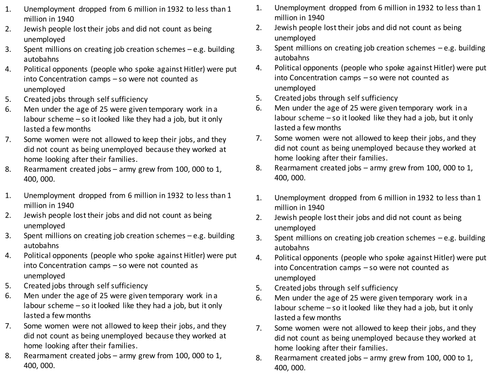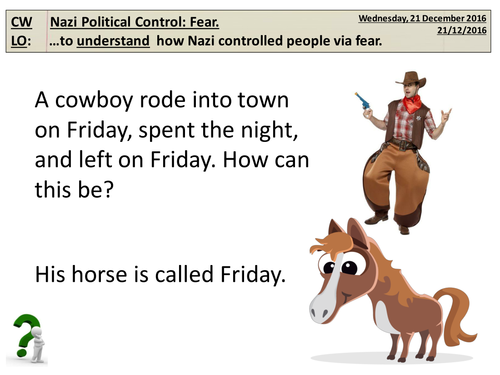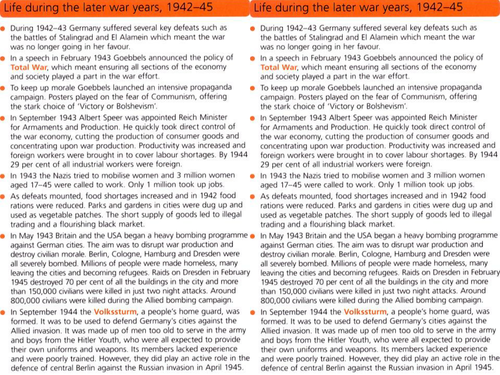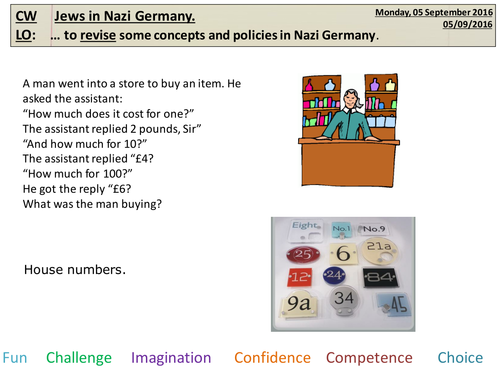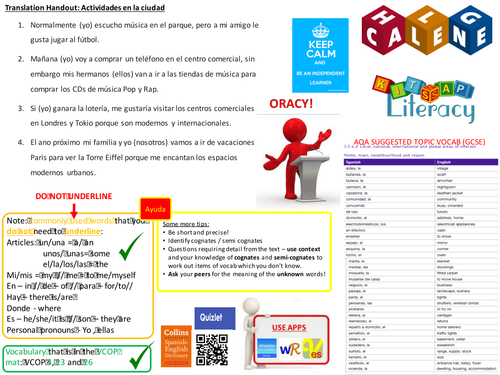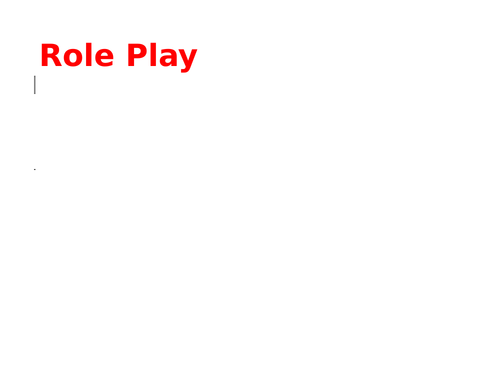
121Uploads
36k+Views
5k+Downloads
All resources

Nazi policies to address economic problems
This lesson is about
The lesson includes a settler, and exam question (WJEC, as usually), All Speak Round Robin activity of the economic problems in Nazi Germany and an I-pad research slide on the ways HIler tried to address the economic problems of the country at the time. As per my previous lessons, it is very easy to adapt 'I-pad research' slide to your needs by providing them with a reference to the pages in the book or by printing some summary out (I like using BBC Bitesize). I then finished the lesson with a 'Keywords' plenary which you can organise however you prefer.
Bundle

Christmas bundle- Spanish/French - KS3/KS4 AQA
This a small bundle of two (possibly three) lessons for KS3/KS4 Spanish students. I also attach its analogue in French. Part of it is a research project than can take 1-2 lessons and another one is a lesson to describe your Christmas day in Spanish!

Early War Years (1939-1941) in Nazi Germany
This lesson is about the life in Nazi Germany in the beginning of the WWII. It includes a settler, an example of how a student's book should look like, a starter (exam question task with a model answer, success criteria, an explanation on how to assess the peer's answer, a peer assessment slide and SPAG control slide), learning outcomes slide, an introduction slide on the WWII, information research task (based on the revision guide page included in this resource), oracy activity and a plenary asking students to explain which social group they would like to belong to in the Nazi Germany.

Opposition to the Nazi Rule: Civilians
This lesson is about opposition to the Nazi rule from civilians. The lesson includes a settler, example of how a perfect student's book should look like, a starter (students have to guess which event is represented by each picture), All Read/Write Robin task (information research based on the revision guide handout provided in this resource), ask a question slide (followed by the question starters' slide), oracy leader task and keyword revision.
Please note that the handout is taken from the WJEC GCSE History revision book.

2. Suffragettes (AQA Cit)
This lesson was prepared for the year 11 Citizenship students (AQA full course). This lesson is on the topic of Active Citizenship as Suffragettes was one of the pressure groups (examiners quite like it as well). It includes settler, starter, learning objectives/keywords introduction slide, an example of a part B question with a model answer and success criteria, followed up by the self-assessment slide (exam question is the same as in the previous lesson on Active Citizenship), a quick activity to revise keywords (unscramble-type), a slide about the suffragettes related to the video (link included) followed by the mini-plenary in respect of the latter. The presentation ends with a cartoon for a plenary discussion which is again the same as in previous lesson.

Opposition to the Nazi rule from the army
This lesson is about opposition to the Nazi rule from the army. The lesson includes a settler, example of how a perfect student's book should look like, a starter (exam question with a model answer, success criteria, an explanation of how to assess the answer of the peer, peer-assessment, SPAG stop slides), information research task with a diagram on the July Plot and Make your own Quiz Quiz trade task.
Please note that the handout includes a print-out from the WJEC GCSE History revision book.

Nazi Control: Propaganda and persuasion
These are two lessons on the other two types of control in the Nazi State: Propaganda and Persuasion. The Propaganda lesson includes a settler, a starter (modified exam question presentation technique that I started using from that lesson onwards), a model answer with success criteria, SPAG control slide, Keyword revision, All Read Round Robin slide to be completed together with the information worksheet attached, and an Oracy task based on Adolf Hitler's quote. The Persuasion lesson is rather short and includes all usual parts of the lesson (settler, starter, etc) and has a team challenge task in it. However, I did not manage to finish the Propaganda lesson initially so the end is exactly the same.

GCSE Spanish - SMSC / Cultural -El Carnaval - Photo Card (AQA)
This is the lesson that I have prepared for my higher y8/ and y9/y10 in relation to the topic of Spanish culture (Festivals & Celebrations) and is mostly related to El Carnaval. I used it as a general topic to look at the photo card task (speaking / foundation writing). The starter focus is reading - students complete differentiated tasks in relation to an authentic extract from on line newspaper.
Students will then learn new / revise already known vocabulary on the topic of carnivals/ festivals using Quizlet and Quizlet live tools. Then they recap on the success criteria for Speaking Q2 / Writing Q1 - Photo card- and complete a photo card task based on a photo of a carnival celebration together. They jot their thoughts first, play a catchphrase game and then prepare their responses in pairs on the second photo card. Finally they complete a third photo card task individually and self / peer assess the same. In-between the photo cards I inserted some verb games to make the lesson more fun for the students and not to let them get bored.
Let me know what you think!

Opinions on TV programmes - Spanish- AQA GCSE Listening (Sec. A- multiple choice / 1 detail asnwer)
This is a lesson on TV shows for an early GCSE Spanish class which can be used with a higher year 8 students.
The lesson includes a translation starter (mini-Reading Section C) to wake the students up followed by phonics practice (resiting tongue twister!). Then I included few mini-tests to recap / check understanding of basic grammar (articles, indirect object pronouns and adjectival agreement).
Then they get to know new words via online quizlet activity. Students are to choose what quizlet task they want to do based on their level therefore this engaging task is differentiated. Then I have included a quick match-up activity to check whether they remember the words they have just learned. I then introduce a Listening activity related to the opinions on TV watching preferences. It has two parts - multiple choice and one detail answer to account for two types of tasks in the Listening exam spec. Students complete a series of tasks to enhance their understanding - translate the keywords into Spanish to make the Listening easier, discuss unknown words in a group and use applications / dictionaries to find out the meaning of the unknown words. Finally they analise the way they should answer the questions , complete the task and self-assess their work. I have included the handout with the task to ease the pain. Please note that there is no listening file - see the end of the presentation for teacher’s handout and for the students one.
Enjoy!

Fuhrer's success: Fighting Unemployment / was Hitler successful?
This lesson is about the success of Fuhrer in Fighting unemployment. The first slide is the handout that should make it easier to complete the starter question (exam practice). You also have a usual settler, Create a quiz quiz trade (students write down a question and an answer from the recently learned topic and go around the classroom asking each other those questions - check Kagan education technique website for further description), a recap from the last lesson (the same activity really - as in my previous lesson - Was Hitler successful in fighting Depression). And, again, peer-assessment as a plenary. Enjoy!

Was Hitler successful in fighting Depression?
This lesson is about the evaluation of Hitler's success in fighting the economic problems. This lesson includes a stand-up question in the beginning that I use to check whether anyone remember's anything from the week before, a settler, a starter (examination practice), Ask a question! activity (students have to ask each other a question in each others exercise books, change back, answer and peer/ self assess it), All Read Round Robin on the success of Hitler's policies (handout with some info attached separately - can be used as a worksheet) and a peer-assessment of the last task as a plenary. And... Food for thought on the quote by A. Hitler!

Nazi Political Control: Fear
This lesson is on the topic of Nazi Control by way of fear. The lesson starts with a settler and continues with a starter (exam question with a success criteria and some tips as well as a model answer, peer assessment and SPAG control slides), Learning Outcomes, Team challenge slide (I usually print one for each table, asking them to compete with other tables), a Fear diagram and a Round Robin activity to discuss the same. Finally, I ended this lesson with an Oracy task designed to discus the quote by Adolf Hitler. I have also included the Team Challenge answers in the end of the presentation.

Motivational Triggers Lesson - Build and Describe a house! French KS3/KS4 (Christmas Starter)
This is the lesson I have made for the motivational triggers week prior to Christmas. This is basically instruction on how to make and describe a house. There is also a detailed guide on how to describe the house using vocabulary on the topic of house, rooms and prepositions of place. My students totally loved the starter.
You can find the templates of a ready made house on the internet - there are quite a lot!
Enjoy taking pictures!

Nazi Treatment of Jews during WWII (Later years)
These lessons are about Nazi Treatment of Jews during WWII (Later years). The slides include a set of my standard activities, such as settler, starter (exam question with success criteria, model answer, explanation on how to assess the answer, peer/self assessment, SPAG control slides), information research task (see appropriate handout) and some fun activities for revision of information.
You can also find this lesson in a pack of lessons about the treatment of Jews through the whole WWII.

Revision on the Nazi Social policies volume 2 / Nazi Control / Persecution
These are revision materials poor to the assessment in the Nazi Social policies, Nazi Control, Persecution and Antisemitism. The vast majority of slides provide general information for the students to remember and revise certain topics that are likely to appear in exam. The lesson includes settler, starter (cross one out activity), information slides and revision activity (revision handouts attached in the end, one from BBC Bitesize website (Antisemitism), another one fro the official revision guide for the course). I also attach another file (Activity) which includes another settler and an exam question example.

2 versions of AQA GCSE (new from 2016) : Activities in town - Exam practice (Reading, Section C)
This is the lesson for my GSCE Spanish class about activities in town. It includes a range of activities to satisfy the school policies, such as Independent Learning, Kagan, differentiation and engagement. I have included a short test to check vocabulary and a quizlet to learn some new words that they would use when completing the Reading activity (AQA new specification Reading Section C). I was trying to teach them how to approach text reading and translation. I also include a handout that I have prepared as an additional help. Please note that VCOP mat refers to reasons, opinions and the tenses.
I attach two versions of the same lesson as one I used with older pupils and another one was amended for the observation (I got 1c/2a feedback!)

AQA GCSE Spanish - Role Play answer strategy
This is a template that I prepared for my higher year 8 Spanish students and early KS4 in relation to answering a Speaking Role Play task. Please note that this is a template and can be reused for different topics.
It starts with a Quizlet slide to revise (whilst being engaged!) some vocabulary prior to looking at the task. There are various Quizlet word lists available so you can just change the QR code and link if another list of words is needed. Then Students together with the teacher discuss the strategies and look at the task, success criteria and marking scheme and revise question words and how to form different types of questions in Spanish. They check their knowledge of the latter by way of completing a quick test and check their answers / discuss mistakes. They then jot their thoughts on a similar Role Play task in pairs (using grammar help - note: we use VCOP mat so if you have one you will need to change the numbers of the grammar points, if not you nees to delete few bits, the examples of structures are provided anyway) and complete in in writing individually . Then their ‘Time Pair Share’ the Role Play and self/peer -assess their work.
Please let me know if there are any problems / ideas!

AQA GCSE Spanish Games Conjugation Learning Grid and Cube// El Bingo (grammar/vocabulary/ revision)
These are few grammar games that I decided to share. I would use them for pretty much all age groups, both KS3 and KS4, GCSE both tiers. They can be easily amended to suit the grammar topics that you wish to reinforce / revise / introduce. The templates can also be easily reused for French.
See enclosed:
Verb conjugation Learning Grid (differentiated) - Students roll two dices to identify the tense and the pronoun they need to use. To make the task more complicated for more advanced students I ask them to create a sentence using the verb they got with particular amount of words to further challenge higher tier students. I would highly recommend it for the KS4 students.
El Bingo (good to promote Vocabulary / Listening / Phonics). Teacher gives studnets 15 words and asks them to write 5 of them down. Teacher then either says the translation of the words on the board (KS3) or defines them in Spanish / English (y9/10/11). If students recognise one of their words they cross it out, first one who crosses 5 wins!
Conjugation Cube. Students create a set of two dices that they will roll together. There are two versions of them to provide for two levels of differentiation. Students play in turns to conjugate the verbs! I included an origami version of the cube in case you wish to ask them to make the cube and to write the questions on their own (I took the scheme from the Google images so I do not claim any rights on that one.)
Let me know how it goes!

AQA GCSE Spanish - Writing (Foundation) answer strategy - Questions 2 and 4 / Higher Question 1
This is a template that I prepared for my higher year 8 Spanish students and early KS4 in relation to answering a Writing Foundation Questions 2 and 4 // Higher Tier Question 1. The topic of this example is celebrations / festivals.
Students begin by translating the short text into English and coaching each other if stuck at the same time assessing each other’s work. Then they revise some grammar by playing tarsia game (see template in the end of the presentation).
Consequently they get on with reading the question and what is required from them and discussing the what they could include in their answer (both content and grammar structures). Then they make a break and play a dice game (can be prepared prior to the lesson or during the same - see template in the end of the presentation) and a learning grid to revise verb tenses. They then get back to the task and work in pairs to plan their answers. Finally they complete the task individually, discuss the success criteria and the marking scheme with the teacher and peer / self assess their work.
Please let me know if there are any problems / ideas!

AQA GCSE (teaching from 2016) : Town and local area - Speaking - Photo card Model answer 1
This is the handout for my GCSE Spanish class to prepare for Speaking assessment. It includes brief success criteria and where to find it, what to include and a template for an answer. I have included both the PowerPoint slide and the handout.

